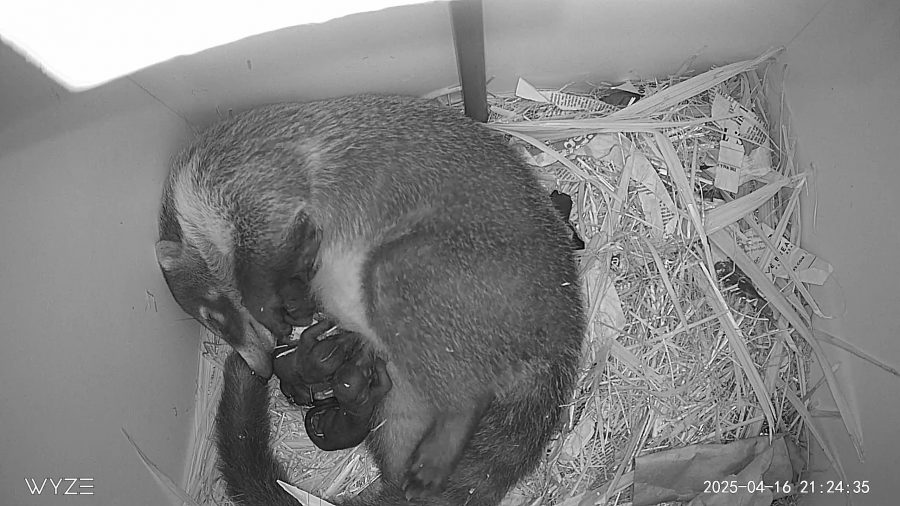

Rita snug in her nestbox, curling up with her newborns.
They’re finally here! We’re thrilled to welcome several white-nosed kits to our Zoo family, marking an important conservation milestone for their species.
On the afternoon of April 16, Sky and Rita both went into labor and welcomed nine kits into the world. Sky gave birth to four kits, but sadly the runt of the litter passed away overnight unexpectedly. Sky and her triplets are doing great, and all three are nursing well and gaining weight. Rita gave birth to five kits and one stillborn. Unfortunately, the young coati mom had some complications with her birth. Several of Rita’s kits were noted to have abnormal umbilicuses, or navels. Our veterinary staff dispensed antibiotics and gave appropriate medical attention, but even with medication three kits were given a grave prognosis and passed away. It is unclear whether the abnormal ambilicuses were the sole cause of their passing or if other complications were involved, but we hope to learn more from histopathology, or the microscopic examination of the cells of organs.
It is common for new moms in the animal world to have complications with their first few births. Sky and Rita are both young moms who have only had one litter prior to this year’s. While we take many steps to help ensure both Mom and babies are healthy during labor, delivery and postpartum, including 24/7 camera monitoring and daily weigh-ins, these events can still happen.
We also speculate that Rita has not been able to nurse properly. It’s possible that Rita was not able to produce enough milk for her offspring, another complication that could have affected her kits’ health. We made the decision to help Rita out and hand-rear her remaining two kits. Our animal care team are experts at caring for young animals that need a helping hand with feeding. We will continue to care for them until they are old enough to be reunited with Rita and their peers. We are dedicated to learning everything we can from both positive and negative experiences, and we have been able to gain important knowledge about this species’ reproduction and how to best care for this species at all life stages, from day-old kits to geriatric coatis.

Sky’s kits received their first exam.
Our kits received their first of many routine medical exams, and we’re pleased to share that our five remaining kits all look healthy. Four are males and one is female.
Last year, our Zoo became the first AZA-accredited zoo in seven years to welcome a new generation of white-nosed coati kits. This incredible achievement was thanks to our Zoo’s director of animal programs, Lauren Hinson, and her team’s dedication to bringing back a genetically diverse and healthy safeguard population of this species in AZA-accredited zoos. We’ve been able to share everything we’ve learned about coati husbandry, pregnancy, labor and birth with other zoos, and we hope this can positively influence the AZA-accredited zoo population as a whole. Our now-one-year-old kits are old enough to head off on their own adventures and be introduced to new coati bands as part of the Species Survival Plan (SSP) plan for their species.
For the time being, our week-old kits will remain in their cozy behind-the-scenes habitat to continue growing and bonding with their moms. We hope in a few weeks they can be introduced to our larger coati habitat and their other coati habitat-mates. We will be sure to keep you updated on our social media channels and this blog – so stay tuned for lots of cute coati content!
Brevard Zoo is an independent, not-for-profit organization that receives no recurring government funding for our operating costs. Your generous support enables us to continue to serve our community and continue our vital animal wellness, education and conservation programs.
